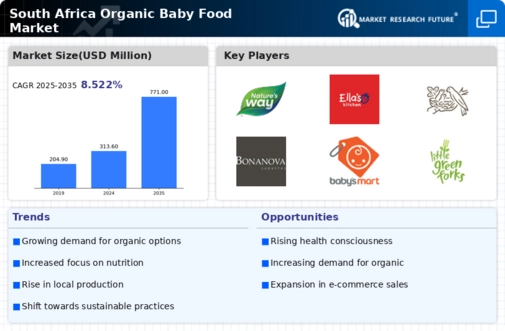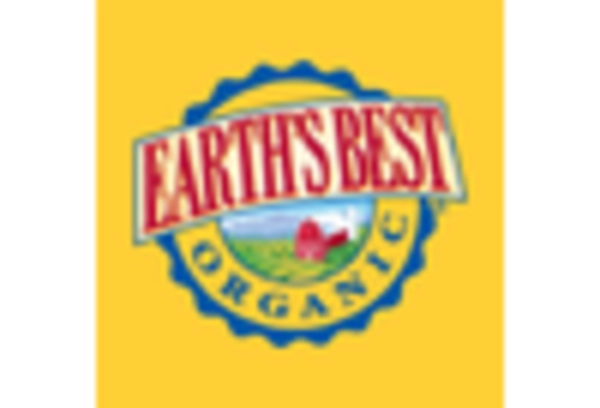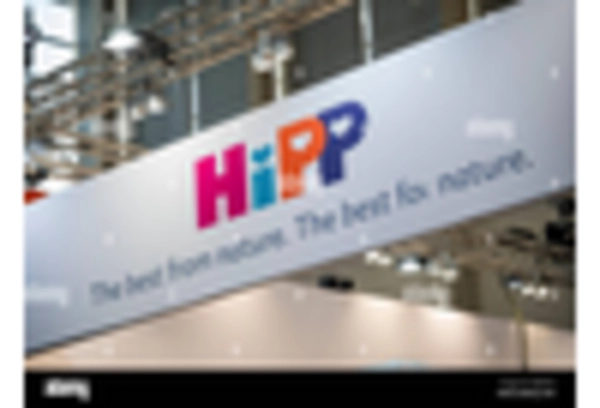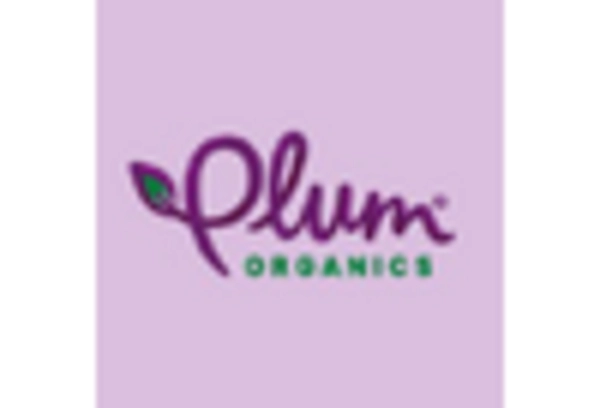Expansion of Retail Channels
The organic baby-food market in South Africa is benefiting from the expansion of retail channels, which enhances accessibility for consumers. Traditional grocery stores, health food shops, and online platforms are increasingly stocking a diverse range of organic baby food products. This trend is supported by data indicating that approximately 25% of South African parents prefer shopping for organic products at specialized retailers. The growth of e-commerce has also played a crucial role, allowing consumers to conveniently purchase organic baby foods from the comfort of their homes. As retail channels continue to diversify and expand, the organic baby-food market is likely to see increased sales and market penetration, as more parents gain access to a wider variety of organic options.
Rise of Eco-Conscious Parenting
In South Africa, the organic baby-food market is significantly influenced by the rise of eco-conscious parenting. Parents are increasingly aware of the environmental impact of their purchasing decisions, leading them to favor organic products that are sustainably sourced and produced. This trend is supported by data showing that approximately 30% of South African parents actively seek out eco-friendly brands. The organic baby-food market benefits from this shift, as companies that prioritize sustainability in their practices are likely to attract a loyal customer base. Furthermore, the demand for eco-friendly packaging solutions is on the rise, prompting manufacturers to innovate in this area. As eco-conscious parenting continues to gain traction, it is expected that the organic baby-food market will evolve to meet the expectations of environmentally aware consumers, thereby fostering a more sustainable food ecosystem.
Growing Awareness of Nutritional Benefits
The organic baby-food market in South Africa is experiencing growth due to a heightened awareness of the nutritional benefits associated with organic foods. Parents are becoming more informed about the advantages of providing their children with organic options, which are often perceived as healthier and more nutritious. Research indicates that organic baby foods typically contain higher levels of essential nutrients and lower levels of harmful substances. This awareness is driving parents to seek out organic products, leading to an estimated 20% increase in sales within this segment over the past year. As educational initiatives and health campaigns continue to promote the benefits of organic eating, the organic baby-food market is likely to expand further, catering to the needs of health-conscious parents who prioritize nutrition for their children.
Increasing Demand for Natural Ingredients
The organic baby-food market in South Africa experiences a notable surge in demand for products made from natural ingredients. Parents are increasingly prioritizing the health and well-being of their children, leading to a preference for organic options. This trend is reflected in market data, indicating that the organic baby-food segment has grown by approximately 15% annually over the past few years. The emphasis on clean labels and transparency in sourcing has become paramount, as consumers seek assurance that the food they provide to their infants is free from harmful additives and pesticides. Consequently, manufacturers are responding by expanding their product lines to include a wider variety of organic offerings, thereby enhancing their market presence. This shift towards natural ingredients is likely to continue shaping the organic baby-food market in South Africa, as more parents opt for healthier choices for their children.
Influence of Social Media and Online Communities
The organic baby-food market in South Africa is increasingly shaped by the influence of social media and online communities. Parents are turning to platforms such as Instagram and Facebook for recommendations and reviews on baby food products. This trend is evidenced by the fact that nearly 40% of parents report making purchasing decisions based on social media influences. The organic baby-food market benefits from this dynamic, as brands that engage effectively with their audience through social media channels can enhance their visibility and credibility. Additionally, online parenting communities often share insights and experiences related to organic products, further driving consumer interest. As social media continues to play a pivotal role in shaping consumer behavior, it is likely that the organic baby-food market will see increased engagement and growth as brands adapt to this evolving landscape.

















